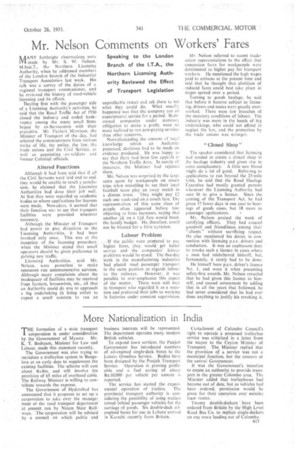Mr. Nelson Comments on Workers' Fares
Page 47

If you've noticed an error in this article please click here to report it so we can fix it.
Speaking to the London Branch of the LT.A., the Northern Licensing Authority Reviewed the Effect of Transport Legislation
/1ANY forthright observations were IVI made by Mr, S. W. Nelson, M.Inst.T., the Northern Licensing Authority, when he addressed membeis of the London branch Of the Industrial Transport Association last week. His talk was a survey of the duties of a regional transport commissioner, and he reviewed the history of road-vehicle licensing and its effects.
Dealing first with the passenger side of a Licensing Authority's activities, he said that the Road Traffic Act of 1930 closed the industry and ended bankruptcy among the many small firms begun by ex-Servicemen with their gratuities. Mr. Herbert Morrison, the Minister of Transport of the day. had -selected the commissioners from various W-alks of life, the police, the law; the trade unions and the Civil Service. as well as appointing .ex-soidiers and former Colonial officials.
Altered Functions
Although it had been said that if all the Civil Servants were laid end to end, they would be unable to reach a conclusion, he claimed that the Licensing Authorities had done their job well. At first they were regarded as academic bodies to whom applications for licerces were made. Nowadays, it seemed that their function was to see that transport facilities were provided wherever necessary.
• Although the Minister of Transport Isad power to give, directions to the Licensing Authorities, it had been invoked only once. This was at the inception of the licensing procedure, when the Minister stated that small operators should be given preference in gaining new traffic.
Licensing Authorities, said Mr. Nelson, were powerless to make operators run unremunerative services. Although many complaintsabout the inadequacy of facilities may be received from farmers, housewives, etc., all that an Authority could do was to approach a big undertaking (it being unfair to expect a Small concern to run an
unprofitable route) and ask. them to see what they could ,do. What usually happened was that the company ran experimental service for a period. Stateowned companies under statutory obligation to make a profit, were no more inclined to run non-paying services than other concerns.
Notwithstanding the amount of local knowledge which an Authority possessed, decisions had to be made on evidence produced. He was happy to say that there had been few appeals in the Northern Traffic Area. In nearly all instance. the Minister had rejected them.
Mr. Nelson was surprised by the large sums spent by workpeople on coach trips when travelling to see. their local football team play an away match in a distant town. They might pay E.' each one week-end on a coach fare, The representatives of this same class of people often appeared before him objecting to fares increases, saying that another 1-d. on a i1d. fare would break the family budget. He, therefore, could not be blamed for a little cynicism.
Labour Problem
-If the public were prepared to pa higher fares, they would get better service and the • companies' labour problems would be eased. The five-day week in the manufacturing industries had placed road passenger transport in the same position as regards labour as the railways. However, it Was 'possible to over-emphasize this aspect of the matter. There were still men in transport who regarded it as a vocation and preferred their jobs to working in factories under constant supervision.
Mr. Nelson referred to recent trade' union representations to the effect that concession fares for workpeople were detrimental to higher pay for transport workers. He mentioned the high wages paid to artisans at the present lime and said that he thought that abolition of reduced fares could best take place in stages spread over a period.
Turning to goods haulage, he said that before it became subjectto licensing, drivers and mates were greatly overworked. There were few breaches of the statutory conditions of labour. The industry was more in the hands of big undertakings, who could' not afford to neglect the law, and the protection by the trade unions was stronger.
"Closed Shop"
The speaker considered that licensing had tended to create a closed shop in the haulage industry and given rise to some complacency. A little new blood might do a lot of good. Referring to applications to run beyond the 25-mile limit, he -said that the Road Haulage Executive had mostly -granted permits whenever the Licensing Authority had seen fit to give a licence. Since the coming of -the Transport Act, he had given 17 fewer .days in one year to hearings of goods cases, but 18 more to passenger applications.• Mr. Nelson praised the work of certifying officers. They had created goodwill -and friendliness among their " clients " without sacrificing respect. He also mentioned his duties in connection with licensing p.s.v. drivers and conductors. It was an unpleasant duty to revoke such a licence in cases where a man had misbehaved bin-Ise-1f, but, fortunately, it rarely had to be done.
He himself bore p.s.v. driver's licence No. 1, and wore it when presenting safety-first awards. Mr. Nelson revealed that he had 'given this licence to himself, and caused amuseinent by adding that in all the years that followed-, he bad never considered that he had ever done anything to justify his revoking it,




















































































